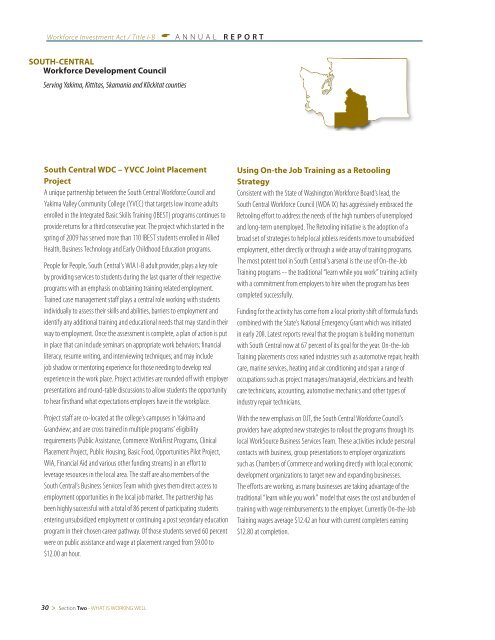washington state - Workforce Training and Education Coordinating ...
washington state - Workforce Training and Education Coordinating ...
washington state - Workforce Training and Education Coordinating ...
You also want an ePaper? Increase the reach of your titles
YUMPU automatically turns print PDFs into web optimized ePapers that Google loves.
<strong>Workforce</strong> Investment Act / Title I-B A A N N U A L R E P O R TSOUTH-CENTRAL<strong>Workforce</strong> Development CouncilServing Yakima, Kittitas, Skamania <strong>and</strong> Klickitat countiesSouth Central WDC – YVCC Joint PlacementProjectA unique partnership between the South Central <strong>Workforce</strong> Council <strong>and</strong>Yakima Valley Community College (YVCC) that targets low income adultsenrolled in the Integrated Basic Skills <strong>Training</strong> (IBEST) programs continues toprovide returns for a third consecutive year. The project which started in thespring of 2009 has served more than 110 IBEST students enrolled in AlliedHealth, Business Technology <strong>and</strong> Early Childhood <strong>Education</strong> programs.People for People, South Central’s WIA I-B adult provider, plays a key roleby providing services to students during the last quarter of their respectiveprograms with an emphasis on obtaining training related employment.Trained case management staff plays a central role working with studentsindividually to assess their skills <strong>and</strong> abilities, barriers to employment <strong>and</strong>identify any additional training <strong>and</strong> educational needs that may st<strong>and</strong> in theirway to employment. Once the assessment is complete, a plan of action is putin place that can include seminars on appropriate work behaviors; financialliteracy, resume writing, <strong>and</strong> interviewing techniques; <strong>and</strong> may includejob shadow or mentoring experience for those needing to develop realexperience in the work place. Project activities are rounded off with employerpresentations <strong>and</strong> round-table discussions to allow students the opportunityto hear firsth<strong>and</strong> what expectations employers have in the workplace.Project staff are co-located at the college's campuses in Yakima <strong>and</strong>Gr<strong>and</strong>view; <strong>and</strong> are cross trained in multiple programs’ eligibilityrequirements (Public Assistance, Commerce WorkFirst Programs, ClinicalPlacement Project, Public Housing, Basic Food, Opportunities Pilot Project,WIA, Financial Aid <strong>and</strong> various other funding streams) in an effort toleverage resources in the local area. The staff are also members of theSouth Central’s Business Services Team which gives them direct access toemployment opportunities in the local job market. The partnership hasbeen highly successful with a total of 86 percent of participating studentsentering unsubsidized employment or continuing a post secondary educationprogram in their chosen career pathway. Of those students served 60 percentwere on public assistance <strong>and</strong> wage at placement ranged from $9.00 to$12.00 an hour.Using On-the Job <strong>Training</strong> as a RetoolingStrategyConsistent with the State of Washington <strong>Workforce</strong> Board’s lead, theSouth Central <strong>Workforce</strong> Council (WDA IX) has aggressively embraced theRetooling effort to address the needs of the high numbers of unemployed<strong>and</strong> long-term unemployed. The Retooling initiative is the adoption of abroad set of strategies to help local jobless residents move to unsubsidizedemployment, either directly or through a wide array of training programs.The most potent tool in South Central’s arsenal is the use of On-the-Job<strong>Training</strong> programs -- the traditional “learn while you work” training activitywith a commitment from employers to hire when the program has beencompleted successfully.Funding for the activity has come from a local priority shift of formula fundscombined with the State's National Emergency Grant which was initiatedin early 20ll. Latest reports reveal that the program is building momentumwith South Central now at 67 percent of its goal for the year. On-the-Job<strong>Training</strong> placements cross varied industries such as automotive repair, healthcare, marine services, heating <strong>and</strong> air conditioning <strong>and</strong> span a range ofoccupations such as project managers/managerial, electricians <strong>and</strong> healthcare technicians, accounting, automotive mechanics <strong>and</strong> other types ofindustry repair technicians.With the new emphasis on OJT, the South Central <strong>Workforce</strong> Council’sproviders have adopted new strategies to rollout the programs through itslocal WorkSource Business Services Team. These activities include personalcontacts with business, group presentations to employer organizationssuch as Chambers of Commerce <strong>and</strong> working directly with local economicdevelopment organizations to target new <strong>and</strong> exp<strong>and</strong>ing businesses.The efforts are working, as many businesses are taking advantage of thetraditional “learn while you work” model that eases the cost <strong>and</strong> burden oftraining with wage reimbursements to the employer. Currently On-the-Job<strong>Training</strong> wages average $12.42 an hour with current completers earning$12.80 at completion.30 > Section Two - WHAT IS WORKING WELL
















